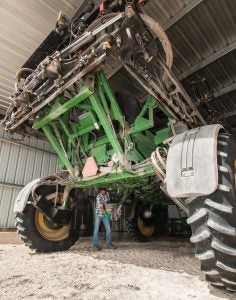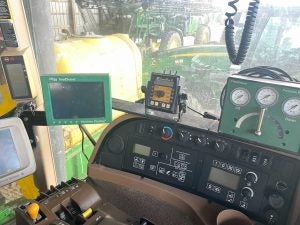The advancements found in modern farm machinery come with a cost: complexity. It can largely be broken down into two basic categories.
Technology that drives the production side of your farming operation, such as advanced planter or sprayer controls, is one. The engine management system integral with Tier 4 emissions control is the other.
But there is a third and a gray area that, in computer-speak, is defined as fuzzy logic. On a farm machine, it is the logic that integrates both the production and propulsion systems. Even if the circuitry is not intrinsically linked, they impact one another.
For example, a combine’s Tier 4 engine goes into default mode due to a perceived issue with the DEF system; or the combine will not engage the header reel due to perceived connection fault.
The person who purchased the subject combine is left with either a header that works but an engine with no power or an engine that runs fine but a header that will not harvest the crop.

The reality of this undesirable scenario is in almost every instance, you are at a loss. For example, a trouble code that sidelines a machine cannot be diagnosed as a leaking hydraulic line or broken alternator belt would.
You are dealing with the unseen, a microprocessor’s conversation with the machine and its response back.
Many believe that at this point, you are at the mercy of the equipment manufacturer to get you back into the field, usually a costly endeavor that may not happen as quickly as you need it to.
And they may very well be correct until you look deeper.
The rest of the story
To many, the Right to Repair movement is the answer to the problem. That is, if you work under the assumption that the status quo has you locked out of the ability to read the trouble codes that are crippling your machine.
That thought process is valid to a certain extent. But it creates a division that places the farmer and the equipment manufacturer on different sides. The truth is, there is no bad guy here.
Technology brings capability, but that attribute requires a new level of complexity not seen before in the agricultural community.
If you are a keen reader, I commend you if, in the previous paragraphs, you picked up on words that I intentionally employed. They are perceived when I gave the example of a fault, and the other being trouble codes.
I sincerely believe this false narrative is not rooted in deception but rather a lack of understanding. (Click below for my Idle Chatter podcast on this topic.)
As much as we may believe that modern farm equipment is on the cutting edge of technology, other than autosteer, the automotive industry used these controls more than 40 years ago.
The control logic and strategy in a 2021 pickup truck or your wife’s family car makes a new farm machine look like a kid’s toy when it comes to system integration and calibration complexity.
Contrary to the narrative being pushed, there have been testing equipment on the market to allow anyone to interface with the engine management system on modern farm equipment without any government intervention; it is called a scan tool.
In a control system of any type, with rare exceptions, a trouble code will identify the circuit with the perceived problem and not the issue or where it is.
The scanner is only one tool that is required. An oscilloscope, flow charts, wiring diagrams, and a digital volt/ohm meter and knowledge of how to accurately use it are the rest.
In addition, since a trouble code is only a circuit identifier, the data the scanner provides needs to be interpreted in a way a soil test must be to glean the proper fertility.
No one talks about all of this, but I do in an episode of my Idle Chatter podcast.
Why you should listen
I stand firmly behind the Right to Repair legislation and support it 100 percent.
I was a test engineer in the automotive industry specializing in engine and driveline calibrations in my other life. I have also taught control system diagnostics to the repair industry and authored two training manuals and one book on the subject.

You owe it to yourself, your family, and agricultural operation to fully understand what is required to diagnose an advanced control system. Even if the legislation passes, you may not have access to everything or even want it.
I invite you to listen and then decide the level of commitment you are willing to invest in.
Make the choice that is correct for your farm’s bottom line and not your pride.
Ray Bohacz, a technical writer in both the automotive and agriculture industries, is the creator the Farm Machinery Digest website and the Idle Chatter podcast. He has more than 3,000 published articles and has been featured in nearly 50 publications.


